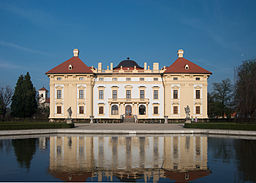Slavkov
| Slavkov u Brna | |||
| Town | |||
|
Castle
|
|||
|
|||
| Country | Czech Republic | ||
|---|---|---|---|
| Region | South Moravian | ||
| District | Vyškov | ||
| Commune | Slavkov u Brna | ||
| Elevation | 211 m (692 ft) | ||
| Coordinates | 49°9′11.72″N 16°52′35.37″E / 49.1532556°N 16.8764917°ECoordinates: 49°9′11.72″N 16°52′35.37″E / 49.1532556°N 16.8764917°E | ||
| Area | 14.95 km2 (5.77 sq mi) | ||
| Population | 6,456 (1.1.2015) | ||
| Density | 432/km2 (1,119/sq mi) | ||
| First mentioned | 1237 | ||
| Mayor | Ivan Charvát | ||
| Timezone | CET (UTC+1) | ||
| - summer (DST) | CEST (UTC+2) | ||
| Postal code | 684 01 | ||
| Statistics: statnisprava.cz | |||
| Website: www.slavkov.cz | |||
Slavkov u Brna (Czech pronunciation: [ˈslafkof ˈu br̩na], i.e. Slavkov by Brno; historically known as Austerlitz) is a country town east of Brno in the South Moravian Region of the Czech Republic. Population: 6.456 (2011). The town gave its name to the Battle of Austerlitz which took place several kilometres to the west of the town.
At the beginning of the 13th century, the Teutonic Order built a monastery stronghold whose remains can still be seen today in the vaults of the Austerlitz Palace. The first written testimony about the place date from 1237. The Czech name Slavkov is first documented in 1361, the German name Austerlitz in 1633. After the defeat of the Order in the Battle of Grunwald, the town became the property of a number of noble owners until, in 1509, the local gentry family of Kaunitz assumed control for more than 400 years. At the end of World War II, the ethnic German majority of residents were forcibly expelled.
The battle of Austerlitz actually took place several kilometers to the west of Austerlitz. Public transport to the site is limited, and the landscape has preserved its bucolic aspects. Agriculture still dominates the hilly terrain which has not changed much (apart from the sprawl of the villages). A highway bisects the battlefield.
Front view of the Austerlitz Palace (with stalls during the 200th anniversary of the battle of Austerlitz)
Church of the Resurrection
St. Urbanus Chapel on a hill over the town
Santon Hill (with visitors during the 200th anniversary)
The Peace Memorial
The cupola of the Peace Memorial
Interior of the Peace Memorial with wreaths commemorating the 200th anniversary
Monument to the Three Emperors at the Old Vineyards
Austerlitz Palace seen from the park at dusk
Austerlitz castle park in French baroque style
Much in the same way that in London, the English have named Waterloo station to commemorate the Waterloo victory, the French gave the name of Austerlitz to one of the major Parisian train stations, the Gare d'Austerlitz. There is also a Quai d'Austerlitz in the XIIIth arrondissement of Paris. In the Netherlands a small village was founded in commemoration of the battle, see: Austerlitz (Netherlands).
...
Wikipedia





